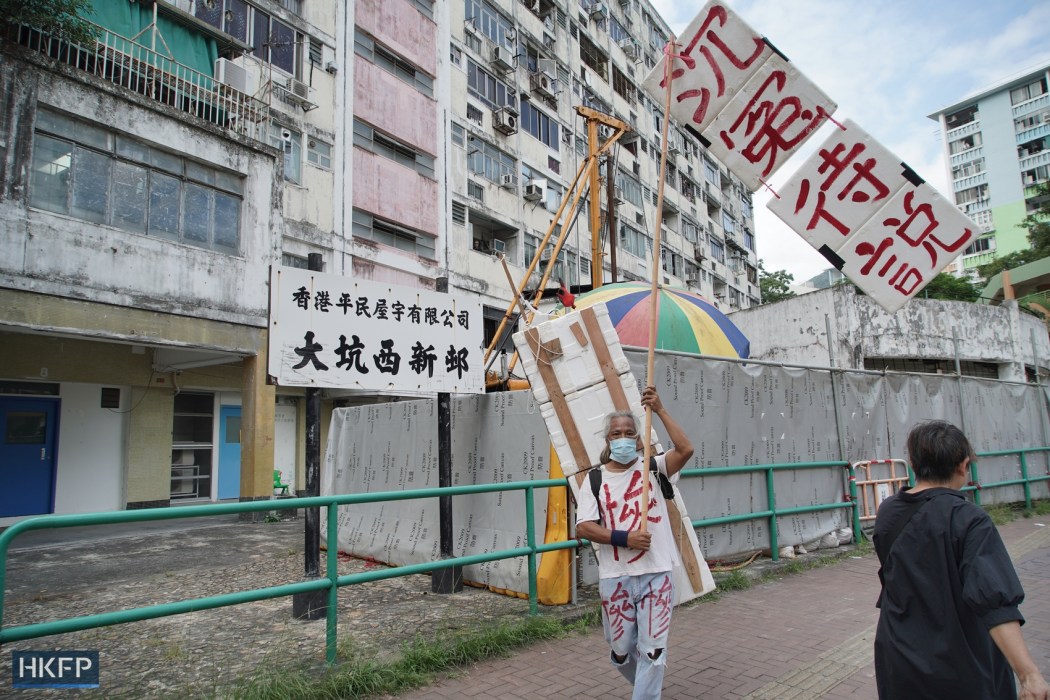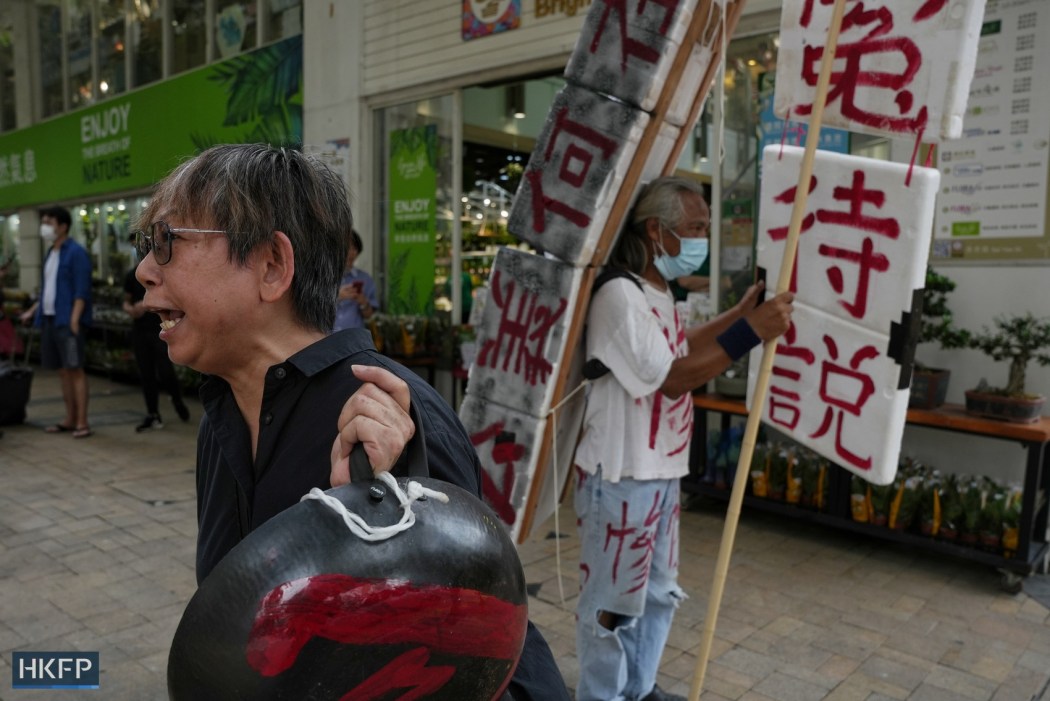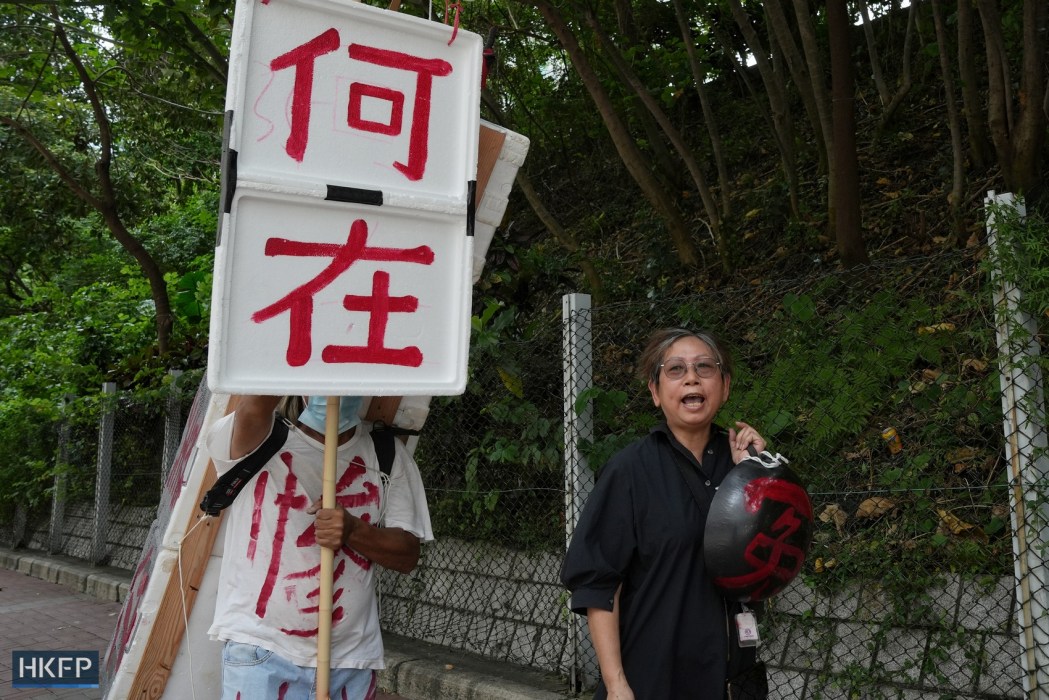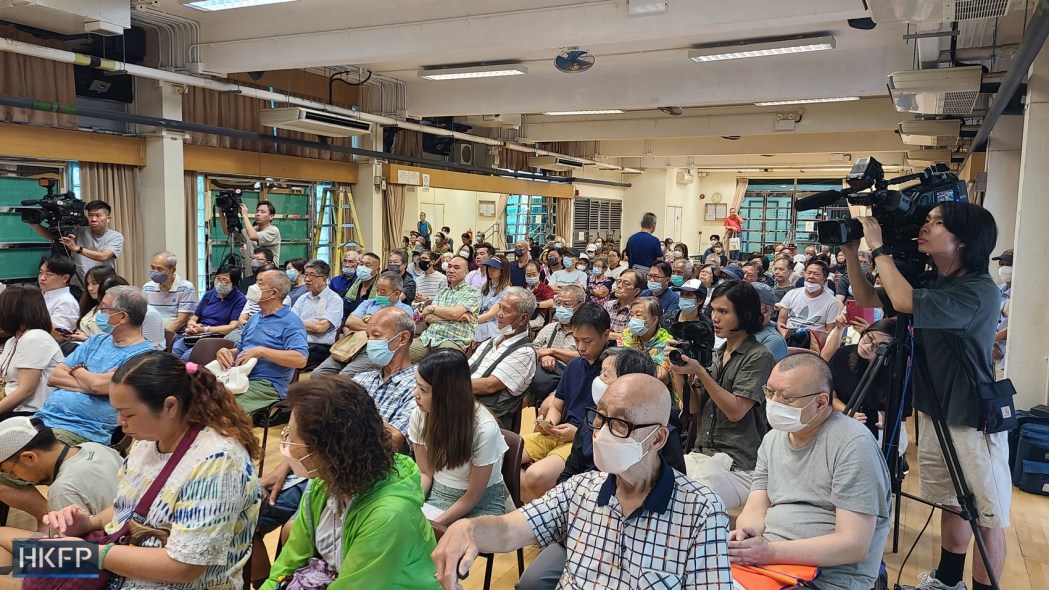A group living at Hong Kong’s only private low-rental housing estate has staged a protest against a relocation plan for elderly residents ahead of a five-year redevelopment period. Residents are expected to leave by early next year.

Residents Kwok Kei-kyun and Kate Auyeung – member of the Resident’s Rights Concern Group of Tai Hang Sai Estate – marched on Friday from the estate in Skep Kip Mei to the Legal Aid Department Kowloon Branch Office in Mong Kok, as they sought legal advice to potentially take their case to court.
Kwok carried a handmade coffin and hoisted a banner made of foam boards that read: “awaiting grievance to be heard” and “where to seek justice?” in Chinese. The duo shouted slogans, including “no proper relocation [when] bringing down our house; losing home when we are old” around the busy streets of Mong Kok.
According to the redevelopment plan, the landlord of the decades-old estate – the Hong Kong Settlers Housing Corporation (HKSHCL) – will offer rent subsidies and relocation assistance to households eligible to move back after the site is redeveloped. It is expected to be completed in 2029, with residents expected to leave by next March.

Auyeung, a 60-year-old who had lived on the estate for four decades, said the relocation plan is “unfair and improper” for many elderly residents: “It’s difficult for elderly residents to rent a place elsewhere, landlords are unlikely to lease to elderly people,” she told HKFP in Cantonese.
According to the HKSHCL’s proposal, for those who are deemed eligible to return, a single-person household will get HK$540,000 in rent subsidies and another HK$30,000 for relocation. This amounts to HK$9,000 of monthly rent subsidies during the five-year redevelopment period.
A family of four, on the other hand, will receive HK$810,000 in rent subsidies – the equivalent of HK$13,500 a month.

But Auyeung said that many residents are old and may not secure a lease elsewhere given this amount of subsidies.
Kwok, 64, said it is unfair that the redevelopment project will offer fewer, and smaller, units to returning residents than new buyers: “It’s like robbing the poor to provide for the rich,” he said in Cantonese.
The HKSHCL plan states that it will provide – at most – 1,300 units for eligible tenants to return, and around 2,000 units for a “Starter Homes” pilot scheme. The policy was introduced in 2017 by then-chief executive Carrie Lam to provide discounted private housing to first-time buyers.
HKFP has reached out to HKSHCL for comment.
Local support
The protest received support from some local residents on Friday.
Lai, a 91-year-old resident who lives alone at Man On House, said he felt anxious and helpless over the relocation plan.

Meanwhile, 33-year-old Mok Hon-yu – a life-long resident at the estate – told HKFP that he supported the group’s demands, as the HKSHCL had not provided enough guarantees to tenants that the project could be completed in five years.
The pair demanded that the HKSHCL directly communicate with them, as they urged the government to help elderly residents to secure a lease, or provide them with a transitionary public housing unit in nearby districts.
In August, more than 100 residents of Tai Hang Sai Estate already held a press conference expressing dismay and saying that their relocation had not been properly handled.

Wong Yu-wa, one of the residents’ representatives, said at the press conference that 80 per cent of the residents were more than 70 years of age.
The government had the responsibility to help relocate the residents for its role in facilitating the redevelopment project, Wong added.
Built in 1965, the estate was the only private low-renting housing in Hong Kong. It was created to rehouse tenants affected by the clearance of the then-Tai Hang Sai Resettlement Area.
Support HKFP | Policies & Ethics | Error/typo? | Contact Us | Newsletter | Transparency & Annual Report | Apps
Help safeguard press freedom & keep HKFP free for all readers by supporting our team

LATEST FROM HKFP
HKFP has an impartial stance, transparent funding, and balanced coverage guided by an Ethics Code and Corrections Policy.
Support press freedom & help us surpass 1,000 monthly Patrons: 100% independent, governed by an ethics code & not-for-profit.










